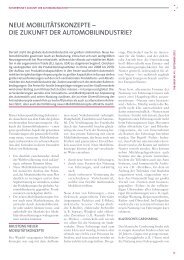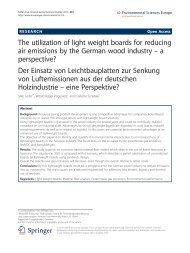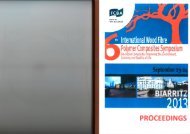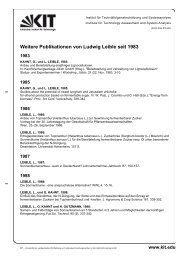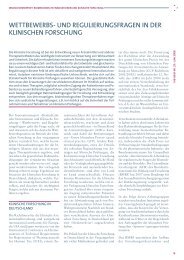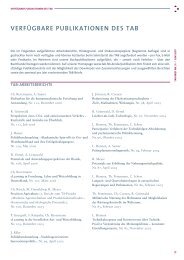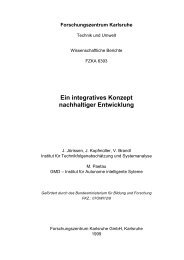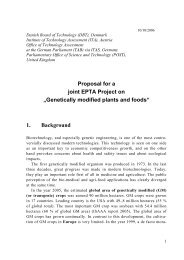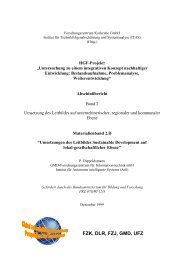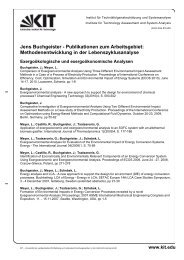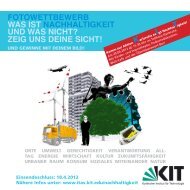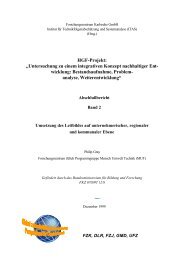Results: RFID and Identity Management in everyday life - ITAS
Results: RFID and Identity Management in everyday life - ITAS
Results: RFID and Identity Management in everyday life - ITAS
You also want an ePaper? Increase the reach of your titles
YUMPU automatically turns print PDFs into web optimized ePapers that Google loves.
ferries throughout the whole Netherl<strong>and</strong>s. But already dur<strong>in</strong>g its first implementation phase <strong>in</strong> 2005<br />
<strong>and</strong> 2006, <strong>Identity</strong> <strong>Management</strong> issues triggered a national debate.<br />
Owner <strong>and</strong> ma<strong>in</strong>ta<strong>in</strong>er of this <strong>RFID</strong> environment is Trans L<strong>in</strong>k Systems (TLS), a consortium of the<br />
five largest public transport companies <strong>in</strong> the Netherl<strong>and</strong>s, represent<strong>in</strong>g 80% of the Dutch market.<br />
Travellers are represented by a whole host of organisations, such as two travellers’ <strong>in</strong>terests groups<br />
(Locov <strong>and</strong> Rover), the Dutch Data Protection Authority (College Bescherm<strong>in</strong>g Persoonsgegevens), a<br />
consumer organisation (Consumentenbond) <strong>and</strong> a privacy watchgroup (Bits of Freedom). Even the<br />
Dutch Parliament got <strong>in</strong>volved <strong>and</strong> discussed the issues at more than 20 meet<strong>in</strong>gs. The Dutch m<strong>in</strong>ister<br />
of Transport took position as mediator between the ma<strong>in</strong>ta<strong>in</strong>er of this <strong>RFID</strong> sett<strong>in</strong>g <strong>and</strong> organisations<br />
protect<strong>in</strong>g the <strong>in</strong>terests of its users. Because of the scale of both the system as well as the controversy,<br />
we analysed this case quite thoroughly, us<strong>in</strong>g governmental documents, user evaluations from<br />
Transl<strong>in</strong>k, publications from privacy organisations <strong>and</strong> pressure groups, newspaper articles <strong>and</strong> on l<strong>in</strong>e<br />
newsgroups. We got our own OV-chipkaart too, to see how the system works <strong>and</strong> talk to other<br />
travellers.<br />
The OV-chipkaart conta<strong>in</strong>s a passive rewritable <strong>RFID</strong> chip, which conta<strong>in</strong>s a unique number <strong>and</strong> a<br />
rewritable section to store <strong>in</strong>formation on travel time <strong>and</strong> uploaded value. Users can opt for an<br />
anonymous card or a personalised card. In case of a discount or season ticket a personalised card is<br />
obligatory. Buses <strong>and</strong> trams have readers placed at the doors, where people check <strong>in</strong> <strong>and</strong> out. Now <strong>and</strong><br />
then a security officer with a h<strong>and</strong>-held reader goes through the bus or tram to check on fare dodg<strong>in</strong>g.<br />
At the tra<strong>in</strong> <strong>and</strong> subway stations travellers check <strong>in</strong> at the platform, hold<strong>in</strong>g their card near a reader <strong>in</strong><br />
order to open a gate. At the start of the project, the total cost were estimated at to be €.1.5 billion of<br />
which a small part would also be paid by local <strong>and</strong> national governments. A first large pilot was held<br />
<strong>in</strong> 2005 <strong>in</strong> the city of Rotterdam <strong>and</strong> the region South West. About 30.000 test travellers started us<strong>in</strong>g<br />
the card <strong>in</strong> the metro, bus <strong>and</strong> one rail track from the city to the beach. A second pilot is currently held<br />
<strong>in</strong> Amsterdam.<br />
In order to get an OV-chipkaart ourselves we needed to fill <strong>in</strong> an application form request<strong>in</strong>g many<br />
personal details: name, address, bank account, signature <strong>and</strong> a copy of our passport. This is quite<br />
surpris<strong>in</strong>g, as the card is a debit system <strong>and</strong> not a credit system. Money can be put on the card through<br />
mach<strong>in</strong>es placed at the stations <strong>and</strong> we did not see why identification was necessary. Accord<strong>in</strong>g to<br />
Transl<strong>in</strong>k Systems anonymous card should also be available <strong>in</strong> time, but these were not offered yet.<br />
Another OV-chipkaart was sent automatically to us by the Dutch Railways, replac<strong>in</strong>g a discount card<br />
we already possessed <strong>and</strong> for which we already provided personal data. The accompany<strong>in</strong>g letter<br />
proclaimed we were now “prepared for a new way of travell<strong>in</strong>g”. It also stated that, once we waved<br />
our card the first time at the reader, this act would be <strong>in</strong>terpreted as an opt <strong>in</strong> for the user agreement.<br />
For details on this agreement we were referred to a website. Although this action can be <strong>in</strong>terpreted as<br />
service <strong>in</strong> order to make the transition more smooth, it is a subtle way to get a personalised card more<br />
accepted than the anonymous card.<br />
On the subway, the OV-Chipkaart worked quite well. When hold<strong>in</strong>g our card near the Transl<strong>in</strong>k sign,<br />
the reader bleeped, displayed the current value of the card, stated we had checked <strong>in</strong> <strong>and</strong> wished us a<br />
pleasant journey. We did however not have to use the card to open the gates. These were left open for<br />
people still us<strong>in</strong>g the paper-based tickets. On the buses however many problems occurred. Sometimes<br />
we could not check <strong>in</strong>. The readers just gave a mysterious code: 707. Most of the bus drivers could not<br />
h<strong>and</strong>le the malfunction, made some jokes about them <strong>and</strong> offered us a free ride. On other occasions,<br />
the readers did not sufficiently check us out, result<strong>in</strong>g <strong>in</strong> a payment for as far the bus would go. One of<br />
our researchers made 40 trips <strong>and</strong> accounted more than half of the transactions failed. A bus driver,<br />
help<strong>in</strong>g her out on many of these events, called her one night at home to <strong>in</strong>quire if everyth<strong>in</strong>g was<br />
sorted out with the card. This account demonstrates the l<strong>in</strong>k between the card <strong>and</strong> the personal<br />
<strong>in</strong>formation <strong>in</strong> the database has not been sufficiently secured yet. F<strong>in</strong>ally, at one occasion we were<br />
checked for fare dodg<strong>in</strong>g by a controller with a h<strong>and</strong> held reader. We then found out the data on the<br />
card also conta<strong>in</strong> our date of birth – yet another bit of identity be<strong>in</strong>g managed by the ma<strong>in</strong>ta<strong>in</strong>er<br />
without our consent.<br />
11



